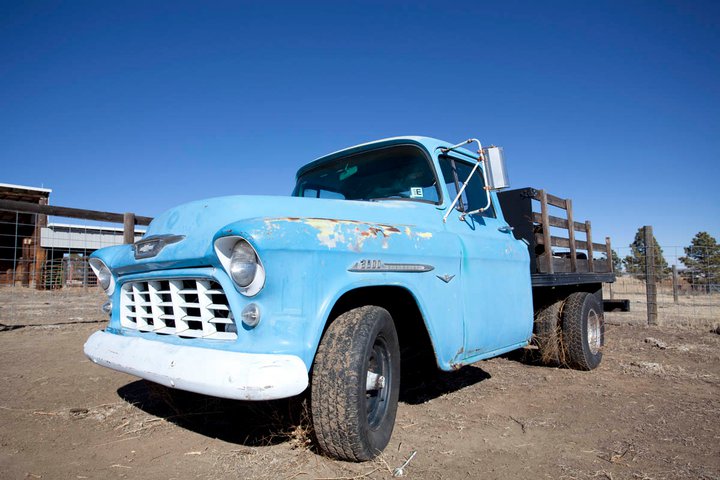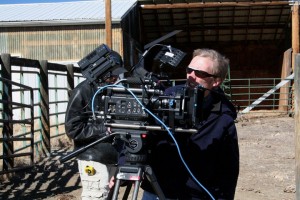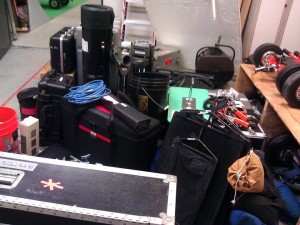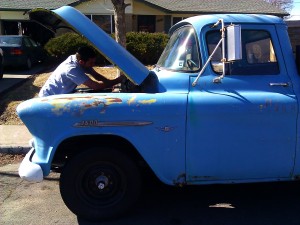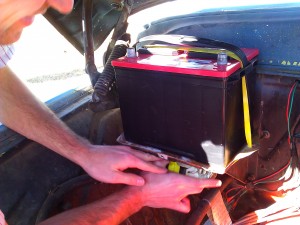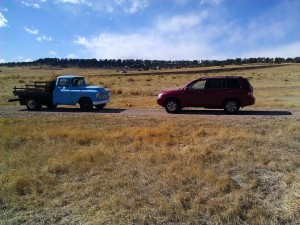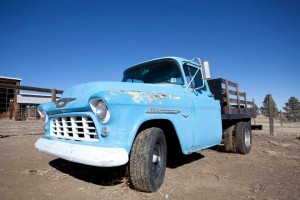Films don’t want to be made. And if they get made, films want to suck. Fight it. Don’t give in. Read on…
The nature of things is chaos. Films (with a story) require some sense of order. To make your film happen, you, the filmmaker, have to fight against the natural flow of the universe.
Ira Glass, host of immensely popular “This American Life” Podcast (and one of my favorite storytellers) provides some wonderful advice:
At 1:55, “All video production wants to be crap”. He’s coming from the documentary/journalism angle, but the point is equally strong for narrative filmmaking.
I spent December through February producing the logistics for my thesis film, “Dreaming of America“. I’ll share a few of my challenges.
Two immediate problems. 1) Farms are generally located in flatter regions and in Colorado, that means wind. No matter who you are, weather will always be an issue in places where weather constantly changes, like Colorado. Maybe you’ve had good luck so far, but shoot outside long enough and things will go awry. That 12′ silk you wanted to use? Forget it!! Over the course of three days, we had wind, rain, snow, fog, and huge flux in temperatures. Fun times. (Though I would have loved to do what David Mullen did with Manure)
2) None of the crew knew anyone that lived on a farm (contrary to popular belief, Denver is not a western farm town). After a few weeks of location scouting, the best location was a quaint house and stable in Kiowa, CO. Despite finding a perfect location with an exceptionally gracious host, we were still a film crew disrupting daily life. We brought 9 cars to a driveway built for 2. We trampled delicate prairie grass. We took over the barn and loaded it with gear. We had a fire in the last scene (that’s another story, some other time).
In a Walgreens world, I would have loved to hand over $5000 cash to the location owner with a smile. In reality, we relied heavily on the owner’s kindness and will hand them a 5.25″ silver DVD. With potential risk for the owner and no tangible value from the film, things very easily could have gone wrong. The owner could have turned a cold shoulder, leaving us (the low-budget no-leverage filmmakers) to figure it out. That didn’t happen and we’re grateful, but the world prefers chaos over order, so as a producer, I had to be ready.
Films don’t want to be made. And if they get made, films want to suck. Fight it. Don’t give in.
Problem 3: Several scenes from the script called for an old tractor. The Old Farmer that won’t give up his land works on it throughout the film. The director ended up finding a beautiful 1955 Chevy Truck and fell in love with it. Thus, the story changed. Originally, my plan was to tow the tractor to the location and drop it off a few days before. Piece of cake. When the vehicle changed, I was slightly relieved. “I might not need that expensive trailer after all,” I mused. “I could spend that money on…. extra craft services!” I made the faulty assumption that the truck would easily drive 50 miles (from Denver to Kiowa) when the owner assured me, “Oh yea, it runs great”. Well… not exactly.
Turns out, the truck hadn’t been started in 2 or 3 months. The previous week we had record cold weather, -20 on some nights. Of course, I found out that the truck wasn’t starting a mere 3 days before shooting. Your mind is so full a week before production that a vehicle failing to start, even if it is 56 years old, hits you from left field. Naturally, I went into panic mode. Again, the unique challenges of having a no money in the budget showed up, front and center. I made 40 phone calls asking around for trucks, tractors, whatever. I found a few reasonable options, most of them costing $400 or higher. Money we didn’t have.
The owner checked into it, couldn’t seem to get the truck to start. A day went by, nothing. The time was swiftly coming when I’d have to pull the trigger on a $400 decision. My gut reaction was to first try and fix the truck. I sent out emails to forums asking for help, called car shops (they don’t give advice for free? what??), tried to get in touch with relatives that might know something. The truck owner called me later in the day and said he got it to start, barely. Something to do with the starter and battery or whatever (shows how much I know about cars). I was partially relieved, but knew that starting the truck was a small hurdle in comparison to the long journey ahead.
Now just one day before production, when all “should” be in order, the owner took the truck out onto the road. He told me later that he was amazed he didn’t wreck the vehicle traveling at 55mph. The steering wheel can freely rotate several inches in either direction without affecting the wheels–a sure way to keep the driver awake!
Amazingly, we made it to the location without an issue.
Almost. The truck died at the bottom of the driveway. Literally 300 yards from where it needed to stop. Hilarious. The owner and I consulted and came to the conclusion that it probably ran out of gas. Luckily, LUCKILY I had a 2 gallon can in my car for the backup generator. We poured in the gas and 10 minutes later the truck fired up, rolling right into place.
It seemed to be such a simple detail, but it turned into such a big issue that could have critically wounded the story.
Films don’t want to be made. And if they get made, films want to suck. Fight it. Don’t give in.
James Drake Films, Denver Video Production

